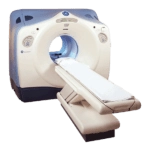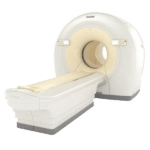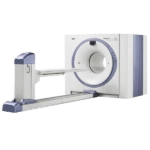GE Discovery ST vs GE Discovery STE PET/CT Scanners
The GE Discovery ST and the GE Discovery STE are both PET/CT scanners (Positron Emission Tomography/Computed Tomography scanners) that combines two different imaging technologies in a single device. The PET component of the scanner is used to create detailed images of the body’s cells and tissues, while the CT component is used to create detailed images of the body’s internal structures.
The main difference is that the GE Discovery STE PET/CT Scanner includes an additional feature called Time-of-Flight (TOF). TOF PET scanners can improve the accuracy and resolution of the PET images by using timing information to more accurately localize the position of the radioactive tracers within the body.
Overall, the GE Discovery STE PET/CT Scanner is an advanced version of the GE Discovery ST that includes the additional capability of TOF PET imaging.
Time-of-Flight (TOF) PET is a technique that can be used to improve the accuracy and resolution of Positron Emission Tomography (PET) images. In a PET scan, a small amount of a radioactive tracer is injected into the patient’s body. The tracer emits positrons, which are particles with a positive charge. When a positron collides with an electron, the two particles annihilate each other and produce two gamma rays that travel in opposite directions.

Get Started
Request Pricing Today!
We’re here to help! Simply fill out the form to tell us a bit about your project. We’ll contact you to set up a conversation so we can discuss how we can best meet your needs. Thank you for considering us!
Great support & services
Save time and energy
Peace of mind
Risk reduction
TOF PET scanners use timing information to more accurately localize the position of the radioactive tracer within the body. They do this by measuring the time it takes for the gamma rays to travel between the detector and the point of annihilation. This timing information can be used to calculate the distance between the detector and the tracer, which can then be used to create a more accurate image of the tracer distribution within the body.
TOF PET can be especially useful in cases where the tracer concentration is low or there is high levels of background activity, as it can help to improve the signal-to-noise ratio of the PET image. It can also be useful for imaging small or deep structures within the body, as the improved resolution can make it easier to visualize these structures.



